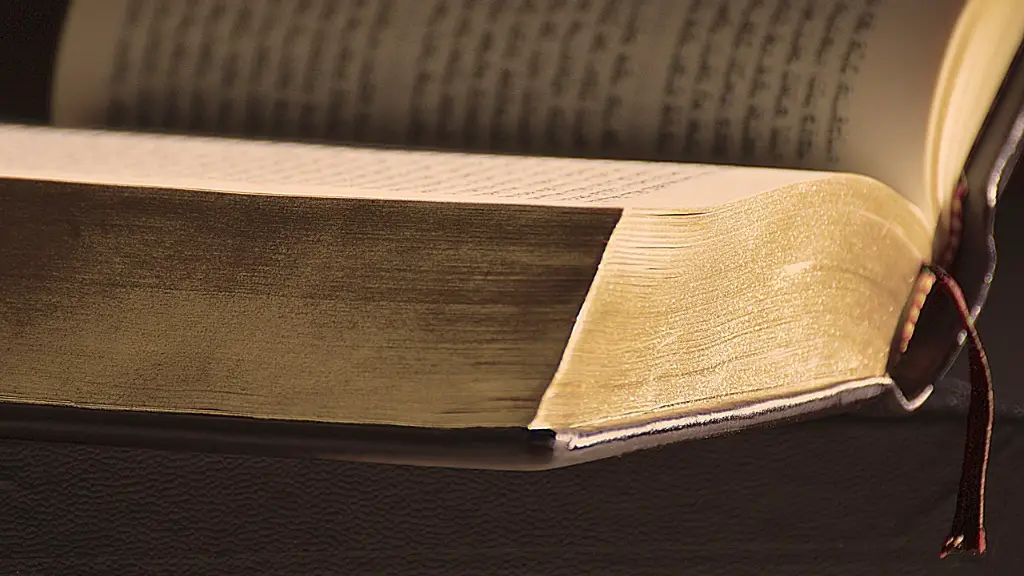The Early Days of Moses
The very first judge referred to in the Bible comes in the form of Moses. As one of the most famous men of the Bible, Moses is immortalized for leading the Israelites out of slavery and guiding them to the promised land. But his reign began long before then, when he was raised as an Egyptian prince, despite being born of Hebrew lineage. It’s during this time that Moses was first tapped to become a judge. After murdering an Egyptian for beating a Hebrew man, he fled to the desert and it’s in Midian that he encounters the Lord and is told that he is to return to Egypt to lead his people out of slavery.
Chosen by the Lord himself, it is believed by experts that in some form, Moses was anointed as a judge by God, despite there being no tangible evidence to suggest this. It is, however, an indisputable fact that he was the first judge of the Israelites and in fact, he even set up wide-reaching judicial frameworks during his time in Egypt.
The Ten Commandments
The laws of Moses as judge are detailed in the book of Exodus. This is where the well-known Ten Commandments are revealed to the Israelites. A set of strict guidelines for everyday life, the Ten Commandments were emphasized by Moses to ensure that the Israelites adhered to their faith in the Lord. While Moses was the first judge to govern these laws, he certainly wasn’t the last. After leading his people to the promised land and subsequent generations becoming ever more complacent when it came to faith and law, the Lord appointed others to replace Moses – ‘judges’.
A Period Of Judges
This period lasted for roughly four hundred years and saw a variety of characters take the helm as judge. Unlike Moses, these individuals weren’t chosen by the Lord, but instead selected by the people. Generally seen as divinely appointed, it was the people’s privilege to select their leader and with that often came a spiritual element. Regardless of the figurehead, these judges were held responsible for guiding the Israelites through difficult and sometimes hostile conditions before the monarchy system was established. True to form, as with many figures in the Bible, these judges have become reflective of the relative eras they lived in and the people they represented.
Deborah
On a more individual level, one such example of a biblical judge is Deborah. Succeeding the judgeship of Ehud, Deborah was the only female judge in the Bible, leading Israel for a period of forty years and subsequently becoming one of the most notable figures in the region. As one of the few female judges to be documented in the Bible, Deborah is credited for being especially successful in terms of ushering in a peaceful period of relative stability. She is also remembered by the Israelites for being a fierce advocate for her people and a strict but fair leader. According to the Bible, Deborah even managed to rally an army, leading this to victory over the Canaanites.
Othniel
Another memorable judge was Othniel. Following the eight-year reign of Ehud, Othniel is known as the longest reigning judge of the era and is remembered for leading the people into a forty-year period of peace. Interestingly though, the Bible does not go into much detail about his character and his position as judge. Despite this, it’s easy to assume that given the state of affairs reflected in the Bible, Othniel must have been a capable and competent leader.
Gideon
Gideon was yet another notable judge. Unlike many of the others, Gideon is known for his reluctance to take up the position. Initially refusing the Lord’s bidding, the Lord reinforces his position before Gideon concurs and chooses to take on the mantle. Typically seen as a symbol of standing up to authority,Gideon is seen by some as a beacon of hope – and faith – for those struggling against oppression. Given Gideon’s success, some believe that he is proof that even the least and most unlikely of people can be used by the Lord for a greater purpose and provide respite for their people.
The Lord’s Will
Finally, it’s important to note that the figureheads of each period of judges were all seen as a direct reflection of the Lord’s will. In biblical times, choosing and anointing a leader was seen as a major moment of faith and given the amount of power that the chosen individual had, this faith was arguably vital. It was this unwavering faith that often saw the Israelites through periods of both peace and war. As a result, the concept of a judge often brings together ideas of power and justice – there was no difference when it came to the Bible.
Conclusion and Impact
All in all, the role of a judge was one of both divine and human importance. Of course Moses was the first to step into this role, leading his people to freedom, albeit after some negotiation with the Lord. But he was followed by a variety of characters such as Deborah, Othniel and Gideon. All of whom were remembered for their fairness and capability in controlling the Israelites. While the period of judges lasted for four hundred years, the impacts of the leaders will linger forever.
The Jewish Influence
The influence of these judges in the Bible can also be seen throughout Judaism. Even today, the Ten Commandments are seen as an integral part of the faith. Regarded as being of divine origin, the Ten Commandments reflect some of the characteristics of the judges who led the Israelites at that time, while also connecting the faiths back to the Lord. Consequently, these laws are still believed to be an integral part of modern Judaism.
The Monarchy System
Another important factor to consider when discussing the judges of the Bible is the monarchy system. The period of the judges directly preceded the establishment of the kingdom under Saul and Israel’s subsequent rule under Kings David and Solomon. As a result, many take the view that the period of the judges is reflective of the condition of the Israelites prior to their becoming a monarchy people. As a result, not only were the judges of the Bible important figures to the people of the time, but their impact on the Jewish faith and society continues to be felt today.
The Legacy of Judges
Finally, it cannot be denied that the legacy of biblical judges lives on. From the Ten Commandments to the establishment of the kingdom under the monarchy system, these figureheads of old continue to be remembered and studied by scholars and theologians alike. Of course, the story began with Moses as the first judge to lead the Israelites in the Bible. But it’s his successors who are often remembered for their individual contributions to the law, justice, and stability of old.



